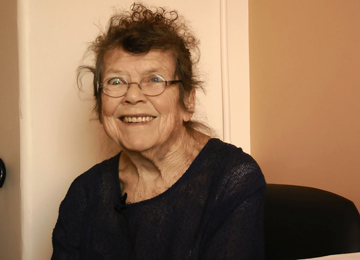Aliza

2 years since diagnosis
Age at interview: 75
Aliza (75 years old) is single. She is retired and has worked as a teacher.
Aliza received her diagnosis in 2011. A lump was detected during a routine mammography; Aliza had not noticed the lump herself before. She found that things moved very quickly for her diagnosis, but the waiting for the surgery was a bit longer. Aliza felt fortunate that she didn’t need to be treated with chemotherapy or radiation. As a family caregiver, she had seen what cancer and chemotherapy treatment can do to a person and she was very relieved to learn that she didn’t need to undergo chemotherapy herself. She did, however, need to take hormone therapy for five years; Aliza calls the hormones ‘the magic pill’ as she is relieved that her treatment exists out of hormones alone. Aliza had to switch medications three or four times though before she found the right pill as she started to have headaches from the first two pills she took. Together with her oncologist, she tested pills until she found the right one for her. Aliza describes herself as an ‘auto-doctor’ as she informs herself a lot through the web. She doesn’t tend to ask questions directly to her doctors when she doesn’t understand something, but rather looks for additional information on the web when back at home. Aliza has also received great support from her sister and brother-in-law who both work in the medical field. They help her find information but also call her daily to make sure she is well. She has not told many friends about her diagnosis as she feels better if people don’t speak about her illness. Aliza tries to maintain a normal life and if she has negative thoughts about her illness, especially during the night, she tries to not panic or imagine all kind of negative scenarios. When she experiences any unusual pains or symptoms, one of the first things that comes to her mind is that it might be a recurrence, but she tries to stop that thinking. If she is really worried, she discusses her concerns with her oncologist.
More content
- Messages to others – AlizaAliza tries to keep a normal life, and not let the disease take control.
- How it affects family and friends – AlizaAliza doesn't have family in Canada but receives phone calls almost every day from her sister who is worried about her.
- Coping strategies – AlizaAliza wanted, as much as possible, to continue with life as normal. She was especially conscious of her need to not be overcome by a sense of panic.
- Physical activity and diet changes – AlizaAliza has not changed a lot in her diet but she experiences less pleasure with eating because she has lost some of her taste sensitivity.